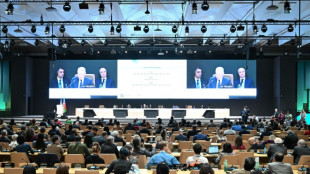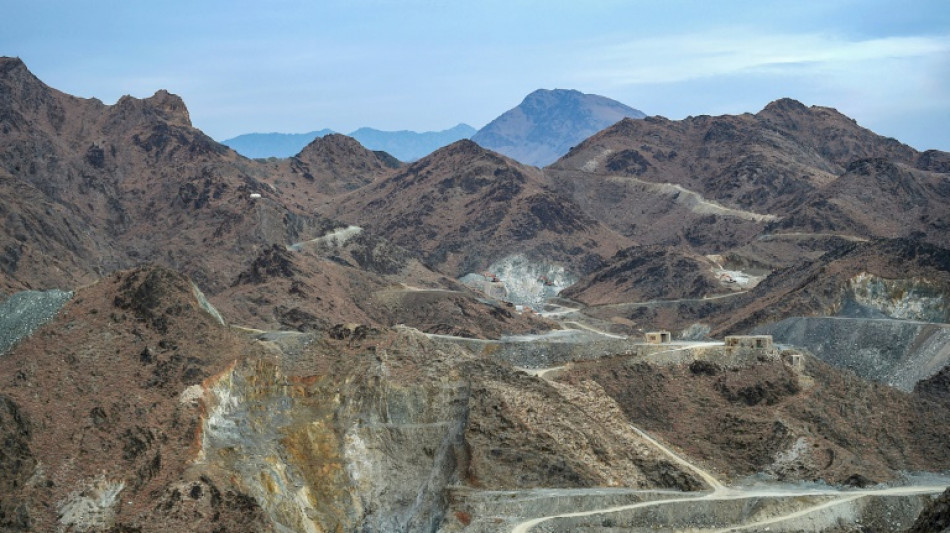
-
 Ireland eye unlikely Six Nations title against uncertain Italy
Ireland eye unlikely Six Nations title against uncertain Italy
-
Duterte's first ICC appearance set for Friday

-
 From oil spills to new species: how tech reveals the ocean
From oil spills to new species: how tech reveals the ocean
-
Curry bags record 4,000th three-pointer as Warriors rout Kings

-
 Hong Kong museum puts Picasso in cross-cultural dialogue
Hong Kong museum puts Picasso in cross-cultural dialogue
-
Alcaraz three-peat bid on track as Cerundolo downed

-
 Chinese, Iranian, Russian diplomats meet for nuclear talks
Chinese, Iranian, Russian diplomats meet for nuclear talks
-
England's Harry Brook banned from IPL for two years

-
 Curry bags record 4,000th three-pointer as Warriors face Kings
Curry bags record 4,000th three-pointer as Warriors face Kings
-
Former sex worker records Tokyo's red-light history

-
 Australians welcome departure of baby wombat grabber
Australians welcome departure of baby wombat grabber
-
Nepal community efforts revive red panda population
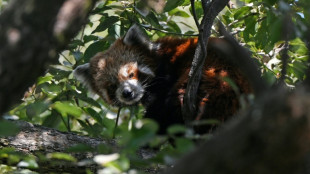
-
 Norris fastest in first Australian GP practice, Hamilton 12th
Norris fastest in first Australian GP practice, Hamilton 12th
-
Doncic drops 45 but Lakers pounded in Bucks loss

-
 Most Asian markets rise on hopes for bill to avert US shutdown
Most Asian markets rise on hopes for bill to avert US shutdown
-
ICC arrest, impeachment leave Duterte clan's political future in doubt

-
 China deports Japanese tourists over Great Wall buttocks pic: reports
China deports Japanese tourists over Great Wall buttocks pic: reports
-
Swiatek to face Andreeva, Sabalenka meets Keys in Indian Wells semi-finals

-
 Messi scores off the bench as Miami progress in Jamaica
Messi scores off the bench as Miami progress in Jamaica
-
War of words: Myanmar migrants face disinformation in Thailand
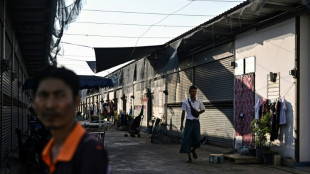
-
 France eye 'supreme objective' of Six Nations as Scotland visit
France eye 'supreme objective' of Six Nations as Scotland visit
-
Barca face Atletico rematch after defeat sparked unbeaten streak

-
 Man City in Brighton test as Arsenal face Chelsea clash
Man City in Brighton test as Arsenal face Chelsea clash
-
Marseille face up to gulf separating them from PSG in France

-
 England's Six Nations ambitions on the line against Wales
England's Six Nations ambitions on the line against Wales
-
Take 'precautionary approach' on deep-sea mining: top official tells AFP

-
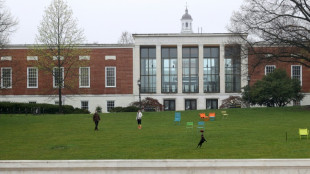 Renowned US health research hub Johns Hopkins to slash 2,000 jobs
Renowned US health research hub Johns Hopkins to slash 2,000 jobs
-
Russian teen Andreeva focused on the job as WTA ranking rises

-
 McIlroy tight-lipped about apologetic heckler incident
McIlroy tight-lipped about apologetic heckler incident
-
Panama 'firm' on canal as US reportedly weighs options

-
 Four-song EP by late singer Faithfull to be released in April
Four-song EP by late singer Faithfull to be released in April
-
You're kidding! Prince William reveals Aston Villa superstitions

-
 Villegas, Spaun and Glover share Players lead, McIlroy one back
Villegas, Spaun and Glover share Players lead, McIlroy one back
-
Top US university says ending 2,000 positions due to Trump cuts
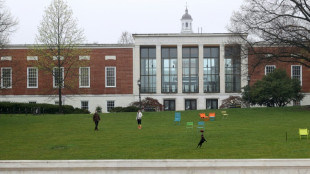
-
 Rangers down angry Mourinho's Fenerbahce to reach Europa League quarters
Rangers down angry Mourinho's Fenerbahce to reach Europa League quarters
-
Brazil top court to consider Bolsonaro 'coup' case on March 25

-
 Amorim 'proud' of Dorgu's honesty to overturn Man Utd penalty
Amorim 'proud' of Dorgu's honesty to overturn Man Utd penalty
-
Medvedev outlasts Fils to reach Indian Wells semi-finals

-
 Fernandes sends Man Utd into Europa League quarters, Spurs advance
Fernandes sends Man Utd into Europa League quarters, Spurs advance
-
Rangers down Mourinho's Fenerbahce to reach Europa League quarters

-
 Odobert double sends Spurs into Europa League quarter-finals
Odobert double sends Spurs into Europa League quarter-finals
-
Fernandes hat-trick fires Man Utd into Europa League quarters

-
 Duterte's first ICC appearance set for Friday: court
Duterte's first ICC appearance set for Friday: court
-
Stock markets tumble as Trump targets booze

-
 Home is where hurt is as Duplantis misses out on new world record
Home is where hurt is as Duplantis misses out on new world record
-
Wales' Anscombe still eyeing 2027 World Cup despite Gatland doubts

-
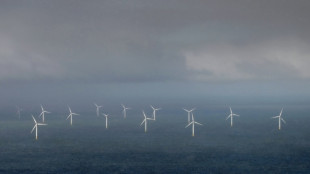 Sea levels rise by 'unexpected' amount in 2024: NASA
Sea levels rise by 'unexpected' amount in 2024: NASA
-
Trump tariff threat leaves sour taste for European drinks producers

-
 Defending champ Swiatek tops Zheng to reach Indian Wells semi-finals
Defending champ Swiatek tops Zheng to reach Indian Wells semi-finals
-
Ex-NOAA chief: Trump firings put lives, jobs, and science in jeopardy
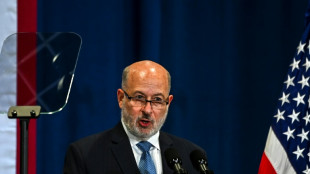

Cash-keen Taliban betting on Afghanistan's mines
A miner in the mountains of eastern Afghanistan poured water over a block of jade, exposing the green stone that is part of the Taliban authorities' push to capitalise on the country's rich mineral resources.
Touting the return of security, the Taliban government is rushing to court local and foreign investors to exploit the country's underground wealth and secure a crucial revenue stream -- though experts warn of the risks of cutting corners.
Emeralds, rubies, marble, gold and lithium: the resources buried across Afghanistan's rocky landscape are estimated to be worth a trillion dollars, according to US and UN assessments from 2010 and 2013.
Though decades of war spared these reserves from large-scale exploitation, roughly 200 contracts -- the majority with local companies -- worth billions of dollars in total have been signed since the Taliban's 2021 return to power, official figures show.
"We want Afghanistan to be self-sufficient but there are obstacles," Humayoun Afghan, the spokesman for the Ministry of Mines, told AFP.
"We have no experts, no infrastructure, no knowledge."
The Taliban authorities will "welcome anyone who wants to invest, especially those with mining experience", he added.
Many of these contracts focus on mining exploration, a process that can take years and yield little results, while loosely regulated extraction can leave behind environmental scars, experts caution.
The US Geological Survey (USGS) has noted the production of coal, talc and chromite, "sharply increased" in 2021 and 2022.
The authorities are prioritising resources that could lose value before tackling others, such as lithium, the prices of which may still rise on global markets.
The mines ministry regularly publishes tenders for exploration and extraction projects, sending their embassies lists of available mining projects to invite foreign companies to apply, according to documents reviewed by AFP.
The World Bank says the results are already visible: a 6.9 percent expansion of mining and quarrying drove an industrial sector increase of 2.6 percent in 2023-2024.
But while the government "has auctioned several small mining contracts to meet its cash requirements, many of these contracts have yet to commence operations", it said in a December report.
For mining sector expert Javed Noorani, authorities are tendering "maybe 10 times more than its own capacity to do things".
- 'Country is stabilised' -
The Taliban fought a two decade insurgency against the US and NATO-backed Afghan government in Kabul, seizing power in a rapid military campaign in 2021 after foreign forces withdrew.
Foreign investors had largely abandoned the country, but security has drastically improved and the country's road network has opened up.
Most now fear being associated with the "Islamic Emirate", which remains unrecognised internationally and under Western sanctions.
However, some countries that maintain diplomatic and economic ties with Kabul, such as Iran, Turkey, Uzbekistan and Qatar, have seized the opportunity, with China leading the way.
"The first thing investors say when they meet with us is that the county has been stabilised so now they want to invest," said Afghan, who estimates that 150,000 jobs have been created by the sector since 2021.
Despite improved stability in the mountainous country, there have been sporadic attacks on foreigners claimed by the Islamic State group -- including a Chinese mine worker killed while travelling in northern Takhar province in January.
- China in the lead -
The Chinese state-owned company MCC is already operating at the Mes Aynak copper deposit, the world's second-largest, located 40 kilometres (25 miles) from Kabul, under a 2008 contract revived by the Taliban government.
Chinese companies have secured at least three other major mining projects, particularly in gold and copper, Afghan said.
At a mine carved out of a mountainside in Goshta in eastern Nangarhar province, jade is extracted to be used in jewellery.
"The majority of our nephrite goes to China," said Habibrahman Kawal, co-owner of the mine.
Kawal is pleased with his thriving business, having never invested in mining before the Taliban takeover.
Only 14 mining companies currently active were operating under the previous government, according to the Britain-based Centre for Information Resilience.
"This suggests that a new set of companies dominates the mining sector in Afghanistan," it said.
The government declined to disclose revenue figures but it profits by taking stakes in some companies and collecting royalties.
- Environmental risks -
Shir Baz Kaminzada, president of the Afghanistan Chamber of Industries and Mines, said some investors disregard international sanctions knowing "they can make money". In countries with strict regulations, "you'll spend billions to start a mine".
"In a place like Afghanistan, where there's very little experience with mining and very few, if any, regulations for mining, that's an advantage to companies coming in," said geophysicist David Chambers, president of a non-profit providing technical assistance in mining activities.
This allows for faster work, but "could cause environmental or economic harm", he said.
The main danger lies in mine waste, as only one percent of what is excavated is removed.
The rest may contain iron sulfide minerals that contaminate the ground if it comes into contact with water.
The mines ministry claims to adhere to existing legislation to ensure that the mines are "cleaned" after extraction, without providing further details.
"Every dollar you don't spend in designing a safe tailings dam (to contain waste) or in cleaning up water, that's profit," said Chambers.
"But again, that leads to potential longer term costs."
In Afghanistan, Kaminzada admitted, "people are not taking care of the long term".
R.Adler--BTB

